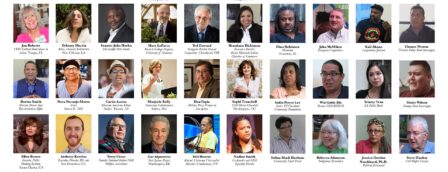A group of churches and nomads discover together the true meaning—and power—of sanctuary. Innovators Jill Severn & Timothy Ransom, Panza Board of Directors Members, who were instrumental in the establishment of a model tiny home community for the homeless.
FOOD FOR THOUGHT & CONVERSATION
- When you are approached by a homeless person for money on the street, what is your inner and outer experience? If you have either experienced or know someone who has experienced homelessness, how does that affect your response, please share your story.
- The national trend seems to be moving from a previous belief that the homeless population is better served by finding jobs and getting into mental health and addiction treatment programs to having a home as a priority. Agree, Disagree and Why?
- There was much learning among the Quixote Village (QV) organizers and supporters that happened along the way to QV becoming a reality. In the initial coordination of volunteers for the tent camps that moved from the grounds of one faith community to another, middle class folks got to know their homeless neighbors, which solidified support for the eventual building of the village. Please share your understanding of how that may have happened and any similar experience you may have had.
- There have been instances nationally where faith communities have been stopped from allowing homeless people to stay in tents on their property. QV organizers argued successfully that allowing that to happen was part of their right to practice their religion. What are your thoughts?
- QV organizers were pretty darn savvy in the political arena from packing local governmental meetings with an abundance of middle class supporters and a few homeless folks to obtaining commitments from potential funders over informal dinners of great food and wine. Please share your experiences and additional thoughts.
ACTIONS
- What relationship do you have with a member of the homeless population in your community? What ways could you expand that relationship?
- Jill identifies two basic human needs– housing and community—that Quixote Village addresses. How is your community addressing the needs of homeless people? How can positive efforts be strengthened and expanded? How might you help?
- Research and share additional information about homeless programs that are making a positive difference around the country.
- Invite friends, colleagues or community members to view this video with you and host a conversation.
ADDITIONAL INFORMATION
Other communities have built tiny home villages for the homeless and affordable ownership. A good example of both those approaches is Square One Villages, a nonprofit organization in Eugene, OR that built both Opportunity Village for the homeless as Emerald Village of affordable tiny homes.
ABOUT JILL & TIMOTHY
Jill Severn is a board member of Panza, a nonprofit organization that was instrumental in the establishment of a model micro-community of tiny houses for the homeless in Olympia Washington. She is a writer and communication consultant. A former journalist, she specialized in international affairs and foreign policy. She served as director of the Seattle World Affairs Council, where she created a professional education program in international affairs for K-12 teachers. She served as a senior policy analyst on education issues in the Washington State House of Representatives, was speechwriter to Governors Booth Gardner and Gary Locke, and Communications Director for the Office of the Superintendent of Public Instruction.
Timothy Ransom is the President of Panza, a nonprofit organization that was instrumental in the establishment of a model micro-community of tiny houses for the homeless in Olympia Washington. He is a retired Environmental Scientist and earned a B.A. in Psychology from Williams College in 1965, and a Ph.D. in Physiological and Comparative Psychology from the University of California at Berkeley in 1972. He worked with Dr. Jane Goodall, became a wildlife photographer and produced a cover article for National Geographic Magazine, and coordinated research and education for the Puget Sound Water Quality Authority and its successor agencies in the state of Washington. Ransom retired in 2002. Tim’s interest in local history afforded him the opportunity to photograph and initiated the “Orcas Elders Project,” ultimately serving as president of the Orcas Historical Society/Museum for several years. His writing projects focus on illustrating the difficulties American society has faced in balancing its needs for public and private lands, honoring work to maintain open spaces.
